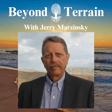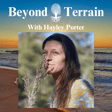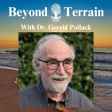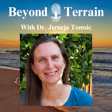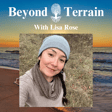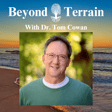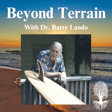Become a Creator today!Start creating today - Share your story with the world!
Start for free
00:00:00
00:00:01

Genesis - Birth of a Podcast
Here begins our journey together into furthering our knowledge and wisdom about well being. This episode covers my story and how I ended up here, creating a podcast. Moreover, we briefly cover some of the central concepts that will be foundational to our discussions moving forward such as alchemy, the state of modern science, what disease is and isn't, as well as the role of the body and psyche. All to be expanded on in the following episodes. Hope you enjoy!
Learn from me
https://www.instagram.com/beyond.terrain/
https://linktr.ee/beyondterrain
Support the Vision
!!!SHARE!!!
BCH: bitcoincash:qq7eq276ylanluc5e39unrqshkvs9xsemg07yxezf7
ETH: beyondterrain.eth
BTC: bc1qqwc470ktgj3l4myqxr5hq67rnlqys0qm98u6f0
Transcript
Introduction and Purpose of Podcast
00:00:00
Speaker
What's up, everyone? Welcome to the very first episode of the Beyond Terrain podcast. I'm your host, Leo Dalton. Today, we're going to have an in-house episode just myself, where I'm going to present a little bit about myself, my journey thus far, and the podcast in general. We're going to go over some of the topics that are central to my thinking and therefore the show as well. So without further ado, let's get into this episode.
Motivations and Key Concepts
00:00:23
Speaker
So on the agenda today, we're going to talk a little bit about why I wanted to start a podcast.
00:00:28
Speaker
some of the major topics to be covered, my story, some sources that helped me kind of get to where I'm at now, central concepts to the show. We're going to touch a little bit on the study of philosophy and alchemy or true science. We're going to talk about state of modern science. We'll talk a little bit about disease, what it is, what it isn't, as well as we'll touch on the role of the body and the psyche as well.
00:00:57
Speaker
Why did I want to start a podcast? You know, uh, there's a lot of reasons, um, and, uh, and we'll get into that more, I think, as the show goes on as well. Um, but one of the things was, is, uh, you know, uh, I really wanted to produce something. Uh, I really wanted to, to help, uh, move this, this terrain model forward. Right. Um, and so basically I feel like it's my contribution, um, partly.
00:01:27
Speaker
I also think it's great for where I'm at in life right now. To start a podcast, I just think I'll be able to connect with a lot of like-minded individuals. I'll be able to learn a lot, right? Because it's not going to be really centered around my thinking. It's going to be centered around the people that we have on. And obviously, I get to share with all the listeners.
00:01:45
Speaker
Um, so, you know, the first couple podcasts are going to be by
Focus on Prevention and Personal Responsibility
00:01:48
Speaker
myself. Uh, and it's kind of going to set the, a little bit of a foundation for the future episodes to come. Um, very centered around the train model of health and, um, how our environment depicts, depicts our health. You know, our internal environment is a direct representation of the external environment. Um, and so that's kind of foundational to this idea. And we're going to talk about, uh, how I got there. Um, you know,
00:02:13
Speaker
What I really want from this podcast is I really want to think about what we're for here and not necessarily what I'm against. Although I'm going to be a little bit of a hypocrite here in the first few episodes where I'm going to be talking about germ theory and modern science and its fallacies therein, I really want to focus on moving forward and solutions. I don't want to talk about everything that's bad in the world because that's just going to bring negative energy and we don't want any of that around here.
00:02:40
Speaker
Although, you know, so it's important to mention, like, I am going to be a little bit of a hypocrite here in my first episodes where, um, but, you know, there is a certain amount of importance to that too, right? Cause, uh, there's a certain amount of unlearning that needs to be done as well. So, um, I do think that's important and, and I certainly wouldn't have put the effort into making these podcasts, kind of compiling all my ideas, uh, if I didn't think it was worth it. So, uh, we're going to do that. Uh, but you know, um,
00:03:07
Speaker
this podcast is really, really going to focus on prevention, right? So, you know, fortunately right now I'm blessed with good health and I truly believe that the best medicine is prevention. Certainly not in the modern sense and their interventions, but in general and living in accordance with nature and living a good, healthy, mental,
00:03:32
Speaker
uh, spiritual, physical life, um, is all, all contributes to, to good health and, and keeping that forever, right? As long as we live, um, you know, and so central to prevention is taking responsibility, right? So, so learning about the true models of health and the true models of mental health and, and, um, you know, everything there and, uh,
00:03:58
Speaker
We need to take responsibility for ourselves, right? There's no one else in the world that can save us or make us healthy or make us not mentally ill, right? It all begins within, right? So we're certainly going to focus on the responsibility aspect of things. And I do want to note that this is not going to be the podcast that's going to take down the establishment. To be honest, I could care less about what other people are doing, right?
00:04:28
Speaker
live and let live. I'm focused on what I'm doing. I'm not here to put other people down for their ways of thinking. I certainly respect everyone else's ways of thinking. If they want to live the life that they want to live and they want to live in accordance to that and everything that that encompasses, that's up
Terrain Model of Health and Ancestral Knowledge
00:04:50
Speaker
to them. You want to live a modern lifestyle, well, you'll likely need modern care.
00:04:58
Speaker
And this is kind of where the prevention comes in, right? Because we certainly want to prevent getting modern diseases. So maybe we should prevent the new modern causes of disease. All right, let's move forward here. So the major topics that we're going to cover is moving the terrain model of health forward. Or I like to say that we're moving it backwards to more ancestral knowledge because we've certainly had things figured out before.
00:05:27
Speaker
You look at any tribe there, they certainly did not have the diseases that we've had. So we've gone astray and we've gone a little too far in our ways and you can see it in the West with the disease that we have. It's plagued our nation. It's plagued the entire world really, but certainly in the West, the chronic illness is a major issue.
00:05:52
Speaker
And prevention is, is, is just central to it. So that's, that's the main, a main focus here. I mean, I will stress that a lot. I will be coming back to prevention all the time. Um, cause, uh, yeah, it's central. Um, so, you know, within this, uh, training model of health, you know, uh, we're really going to be focused on, on new frameworks, new paradigms, uh, new biology, new, you know,
00:06:21
Speaker
new concepts that are really old concepts. We've figured that stuff out before. We know it. One thing about the modern framework that really holds them back is that they need to understand everything. They need to understand the details of everything and they cannot say that they don't understand something or they don't know something. Here, we're not going to be ashamed to say that we don't know stuff. There's a lot that I don't know. The more that I learn, the more that I realize I don't know.
00:06:51
Speaker
You know, I'm no know-it-all and I'm no expert, per se. I just really want to focus on learning and expanding my knowledge. And I think that's a great place to start, especially in your younger years, because knowledge is power and it's never going to be more important than it is right now. So really within this, you know, terrain model of health, we're going to be looking at new science, the new biology.
00:07:20
Speaker
new models of our cells, our systems, even our mental. We're going to look at some ancestral knowledge from around the world we could take from every single line of ancestral wisdom and integrate it into our lives. We're going to be looking at their medicine. We're going to be looking at psychology.
00:07:47
Speaker
definitely going to focus on that a little bit because, you know, the psyche is kind of the mediator between the biological realm and the social realm, which do have very important roles in our lives.
Holistic Health and Archetypal Frameworks
00:08:02
Speaker
So we're certainly going to focus on that as well. And, you know, the train model class is very, very holistic, right? So we're really going to be, you know, looking at everything, right? We're not going to
00:08:15
Speaker
We're not going to just take one part, look at that and look at it by itself because it's useless. Everything's connected. We know that. It's a very obvious thing that everything's connected. You look at an ecosystem and take the frog out of the ecosystem and try and study the frog. Well, is the frog going to behave naturally? I don't know. I don't know about that unless you can mimic its environment absolutely perfectly, which we can absolutely not do.
00:08:45
Speaker
So yeah, within that we're going to look at societal factors as well. Um, obviously not through a social justice lens is because we're all about taking responsibility here. We're not about victim hood here. Uh, we really, really want to focus on responsibility. Uh, you know, and to a certain extent, we're going to try and merge spirituality and science together for a lack of better words. Uh, but, uh, definitely open to talking a lot about that as well. Uh, spirituality, definitely not the,
00:09:14
Speaker
dogmatic ways of thinking in that either. We're certainly going to keep it open and true to nature and definitely want to touch on art, architecture, things like that, because that certainly affects our psyche, which in turn definitely affects our bodies. And we're going to talk a little bit of philosophy, too. I just find that interesting. It may not be the most useful thing to ponder on, but a little bit of philosophy.
00:09:43
Speaker
never killed anybody. So we'll probably touch on that as well. Um, but yeah, so essential to the podcast again is just living well. We want to live well. Uh, we want to have top of the line health. Uh, we really want to optimize our health. Um, and this is going to happen through the physical, mental and spiritual planes. Um, you know, and so mentally we're going to, we're going to look at things. I like to look at things through the, uh, a king warrior magician lover stance. Um,
00:10:14
Speaker
You know, where a king is a provider, you know, they're prosperous, right? They have their kingdom, they have, you know, their high steam, and this aspect is certainly important for a young man. And we'll touch on the feminine side of things. You know, I'm not a female, so it's hard for me to talk for them, but hopefully we can get some people on to talk about that.
00:10:43
Speaker
But as for men, we'll certainly talk about this framework, this King Warrior Magician Lover. It's a Jungian concept. And, you know, so King, yeah, Prosperity Warrior, of course, learning, knowing how to fight is not a natural thing. Being healthy is central to that and central to the warrior archetype.
00:11:07
Speaker
You know, being strong, being physically able. So the magician archetype would be knowledge, wisdom, mental constraint, power, discipline, things of that matter. And the lover, of course, family-oriented, joy, pleasure, doing things you love, play, right? Raising children, animals, things of that nature. So I like to take that framework. It's certainly helped me in my life.
00:11:32
Speaker
kind of structuring the way that I want to go about things. So this podcast is kind of fitting into my magician and king archetype, right? Because through this podcast, I've been learning more and more and more already, even just in the preliminary kind of making of it. And I'll only continue to learn as I have guests on and all that. And so I'm also producing something, right? So some would argue that maybe a podcast is not the most productive thing.
00:12:01
Speaker
And it's not an absurd argument, but it's a step in the right direction. So we don't necessarily need to start with opening up a university to get knowledge out to people. So although that might be a valuable goal down the road, we'll see. So within this living well idea, we're going to talk about other things as well, like farming. I'm big into the permaculture, biodynamic
00:12:27
Speaker
approach. We're going to talk about individual sovereignty, autonomy, self-reliance. Those are all central to being a good man and to being a good individual.
Pandemic's Influence on Health Perspectives
00:12:39
Speaker
We're going to talk about living naturally, living in accordance with nature is just fundamental, and that's just fundamental to health, in my opinion. If we're disconnected with nature, you're disconnected from health, you're disconnected from everything. That's going to be part of it as well. We're going to talk a little bit of financial freedom. I would like to get into some more financial talks with some people because in the modern world, there's a certain amount of
00:13:08
Speaker
modern living that we have to abide by and now finding the line of living the more ancestral primal way of life to keep our health and our mental health stable.
00:13:21
Speaker
We can certainly take that and translate it into a modern way of living prosperously, right? So through financial freedom, we can certainly gain back a lot of sovereignty that we wouldn't have if you're doing without, right? But you certainly don't want to gain financial freedom at the cost of your mental or physical or spiritual health, right? So it's about finding that balance. And I do want to talk about that on the show quite a bit, because I think that's important.
00:13:51
Speaker
Because even eating healthy is very expensive. Some would argue it's not. I would argue if you don't have time to do a lot of the stuff yourself, it is. So we'll talk about that as well. And it fits into the King archetype, right? So you'll probably hear me reference that a lot. But yeah, and so again, here I have noted prevention is the best medicine, which it is.
00:14:19
Speaker
There are many misconceptions of prevention. You know, prevention begins in the mind for sure. If you pigeon hold yourself with ideas and complexes that, you know, you're diseased or you're anxious or you're this or you're that, right? That will manifest.
00:14:45
Speaker
So we'll certainly talk about that, our mental state as prevention, and of course, physical as prevention as well, right? You know, is avoiding animal foods the best prevention for avoiding heart disease? Well, not really. And we'll talk about that further.
00:15:06
Speaker
So we'll certainly highlight a lot of these misconceptions in the podcast. And we'll talk about a lot of preventative measures that are true to nature. You know, my rule of thumb is that if it's not natural, don't do it. But just because it's natural doesn't mean that it can't harm you. So that's kind of my, my rule of thumb there. So let's get into a little bit about my story. You know,
00:15:31
Speaker
This might be the more boring part for some people, so check the time stamps and you can skip past it. But I want to talk about a little bit how I got here. You know, so, you know, growing up, like I went to a smaller school, same school for my entire life, I had a really tight knit group of friends, which
00:15:49
Speaker
Which looking back was the absolute best thing that could have happened to me growing up because all my boys, they're right on. They're all free thinkers. We were all for ourselves. We were all for the boys.
00:16:03
Speaker
And, you know, they're brothers, more so than friends. But we certainly fostered the sense of independence and growth and even unity within a smaller friend group, not necessarily unity and global ideas. Right. So, you know, because that can get very dogmatic and, you know. But we were very about our own well-being and we looked out for each other. Right. So there's that balance of
00:16:32
Speaker
of being really pragmatic with yourself, right, and being an individual. But there's also this notion that you need a certain amount of affiliate of nature, of being around other people and helping them out because we are social beings for sure, that can't be denied. So yeah, went through school, certainly didn't think that I was going to go to university, the change of heart and was financially driven.
00:17:02
Speaker
Uh, wanted to be a dental surgeon actually. Uh, so I went to school for biochemistry in my undergrad, uh, originally biology, but quickly switched out of that and thought biochemistry was more up my alley, which in a way it was certainly more than biology, but certainly has its short balls now looking back. Um, and you know, the, the biochemical.
00:17:27
Speaker
classes that I took were largely centered around genetics, which was not the most interesting thing to me. I certainly wanted to learn more about metabolism and I learned a little bit about it, but really not in the way that I wanted to learn. I certainly got more out of a lot of my electives than my science classes because they're so riddled with
00:17:51
Speaker
with dogma, it's not even funny. And we'll definitely be going over some of that in the future podcast here. So of course, in my university career, we got hit with the big fiasco that many call the pandemic.
00:18:10
Speaker
Of course, we don't necessarily abide by that narrative here on this podcast. But I will say that I've never been so grateful for anything in my life because it's certainly allowed me to open up my eyes and really allow me to unlearn a lot of things and relearn a more truthful way of living.
Challenging Germ Theory and Embracing Terrain Theory
00:18:32
Speaker
It afforded me a lot of time to think, right? So I switched out of biochemistry.
00:18:38
Speaker
my route of going down into dental dentistry or being a dental surgeon.
00:18:45
Speaker
So, you know, I'm forever grateful for that because, you know, I would certainly not be here. I would certainly not think the way I do if, if it weren't for that. So, um, we can't have any regrets or anything like that. Um, and you know, it was hard times. It was, it was the dark night of the soul. It was, uh, it was a tough road, but, but, uh, coming out on the other side was, was really beneficial. It was, it was huge. It was definitely, uh, definitely central to, to who I am now. Um,
00:19:12
Speaker
So with that, like through that time, a lot of unlearning took place and, and a lot of relearning as well. Right. So, um, I did start to get into more ancestral ways of thinking, uh, into more bio-terrain models of health. It didn't take long really. Um, you know, by March of 2020, I was, I was already deep into Andrew Kaufman's work in the, in the terrain model health and his study on exosomes and, um,
00:19:42
Speaker
And that man is really, really a blessing to the world. But I did stumble upon his works. I was actually just scouring the web and learning about the COVID and the virus and originally looked at how it was a leak from a lab, right? And went down that rabbit hole a little bit. But then it led me to the truth. I stumbled upon a video.
00:20:11
Speaker
And they were talking about how germs don't cause disease. And I went down into the comments and I wrote this big, long paragraph of a comment about how germs cause disease. And you don't know what you're talking about. And I studied microbiology and we know the mechanisms of viral entry and how bacteria cause disease. And we know their toxins and their endotoxins and all of this stuff. And the
00:20:40
Speaker
The maker of the video just responded with a link to another YouTube video. Quotes were feuding germ theory. And it was posted on Andrew Coffin's channel. And that was an eye opener, I'll say that. That was an eye opener. And so, yeah, getting into Andrew Coffin's work was really a blessing for me. His video Rooster in the River of Rats was great for highlighting how coaxed postulates have never been attained. You know, he went over a bunch of papers
00:21:10
Speaker
on why it's never been done and the logical fallacies in the isolation processes. So that was really important. And then another really foundational
00:21:24
Speaker
guy was Tom Cohen. He's amazing as well. And I think Andrew Kaufman actually posted his work. I certainly learned of Tom Cohen through Andrew Kaufman, but Tom's video on a lesson on logic was amazing. I think he used the ping pong ball analogy to highlight how we've come to the idea that viruses cause disease and the logical fallacies they're in and phenomenal, phenomenal video.
00:21:52
Speaker
I really, really urge people to check out those two top videos as a starting step for this idea. And then really, you know, it just started growing from there, right? Like every day I would wake up and like, I would really try to disprove the idea of the terrain theory and I would really try to prove the germ theory, right? Because I didn't necessarily want to change my way of thinking, you know, I was already schooled a couple of years and in a higher education and
00:22:21
Speaker
I thought, well, how could they be wrong? How could everybody be wrong? How could this idea be so incorrect and so popular at the same time, which is a logical fallacy in itself? But it was really snowballing from there.
00:22:38
Speaker
And the more I tried to prove the germ theory, the more I disproved it. And the more I tried to disprove the terrain model of health, the more I proved it. So really, it was just obvious. And it only takes a little bit of logic to really see through it. But the mental fortitude to be able to
00:22:57
Speaker
accept that what you've learned is wrong is the most important part, really, because, you know, you could be told the information, but if you're going to take it in and consider it truthfully and honestly, that's a different story, right? So that takes a lot of mental fortitude as well. But yeah, continuing the videos that really helped shape me. One was a Hippocratic hypocrisy by Andrew Kaufman and Space Busters. That was absolutely phenomenal.
00:23:24
Speaker
Yeah, just highlighting the history of the germ theory and how modern systems have taken over. Another great one. We're going to go over a little bit about the history of germ theory in the next podcast. But that one was a very concise video. I'd highly recommend it.
00:23:45
Speaker
Another great one was the culture of scientific misdirection by Thomas Woods Jr. again posted on Dr. Andrew Coffin's channel. Another phenomenal video just highlighting the fallacies and the studies that have been done on things like just modern ways of medicine.
00:24:10
Speaker
getting into this thinking, you know, I really wanted to dig deeper. And so I started getting some books, right? So initially, I started with the videos and, and then I really, really wanted to get into it. And so we got into my first book was inventing the AIDS virus by Peter Duesberg. That was absolutely phenomenal. Really highlighted for me
00:24:30
Speaker
the problems within the modern scientific community, right?
Historical Insights and Alternative Health Theories
00:24:34
Speaker
And even just how people go about publishing things and the peer-view process and how science is more of a popularity contest and a political thing than anything. We've gotten really far away from true science, which is so problematic. There's so many vested interests and problems in it.
00:24:54
Speaker
Another really important book for me was More of Residence by Rupert Sheldrake. And this was really, really an amazing book because he's a big merging spirituality or religion with science and how they don't exist independently. And he highlighted a lot of issues with the current scientific field and their dogma and vested interests as well. So, you know,
00:25:22
Speaker
Like opening up my mind to the corruptness of the scientific community and scientific field was very important because you don't necessarily think that there's a benefit to having this information put out and this agenda and these modern ideas put out. But it really does serve as a way to
00:25:47
Speaker
Well, it always all comes down to money, right? It always comes down to money. So follow the money and you'll find the truth. But in continuing with the books that help me get here, What Really Makes You Ill by Don Lester and David Parker, just an amazing book, comprehensive book, might be the best book to begin with. It's rather big and dense, so it might not be as well. I do have a reading list that I will provide here in the next upcoming slides. But What Really Makes You Ill, very comprehensive.
00:26:18
Speaker
You know, when I initially read it, I skipped sections because I actually didn't want to believe the sections. Like I skipped the section on vaccines and I skipped the sections on like, you know, things like antibiotics, right? Because I didn't necessarily want to believe that those were unhelpful and potentially dangerous or most definitely dangerous.
00:26:36
Speaker
But yeah, so it certainly was a very important book and going back after funny, like reading them like years later, I skipped them and didn't read them, right? So I was starting to kind of get into this, well, it's obvious that germs and microbes don't cause disease, but I still didn't really want to accept fully what that entailed, right? But using logic, you know, it's obvious what that does entail, if that is the truth.
00:27:01
Speaker
And so a couple of podcasts that I got into, Alpha Vedic, Dr. Bael Prollando is absolutely phenomenal, Fountain of Wisdom with Mike Winter, another great mind. Another great podcast is The Terrain Theory and humanely podcast. I'd highly recommend checking those out as well. They're fantastic resources.
00:27:21
Speaker
And so here's the reading list that I would likely recommend to someone who kind of want to get into this. I always recommend Nutrition and Physical Degeneration by Weston A. Price. Just an absolutely amazing read. You know, studying the natives from around the world, right? Different groups of natives. You know, I think there was, there was certain, there was over 10 different untouched native tribes where he compared the
00:27:49
Speaker
natives consuming a native diet and living a native way of life compared to the exact same native group living a modern way of life consuming a modern diet.
00:27:57
Speaker
and show the differences in their teeth. So cavity incidence went from 1% to 5% in the native groups to 30% to 60% in the modern consumption groups. So just an amazing read. And it kind of highlights the importance because he does touch on tuberculosis and how it was never seen, and this was a big disease at the time, how it was never seen in
00:28:22
Speaker
in the natives consuming the native diet and living the native way of life, but it was always seen in the same native group consuming the modern way of life and diet. So the next book I'd recommend is The Moth and the Iron Lung by Forrest Moretti. This was another great book, a beautiful read, really easy to read, kind of just highlighted the discrepancies in the way things flowed. It kind of goes over the history of polio. Of course, on how
00:28:52
Speaker
it likely was in the little virus that caused all of these polio cases, but rather toxicities like Paris green, lead arsenate, and eventually DDT. Some claim the polio vaccine actually caused some. I wouldn't be surprised if that caused polio as well, but the cases of polio were certainly on the decline before the vaccine was rolled out. Obviously, that is the story.
00:29:21
Speaker
and with every single vaccine that's ever been rolled out cases are always on the decline or it comes out and nothing changes like influenza or COVID vaccine for that matter. The next book I'd recommend is The Invisible Rainbow by Arthur Fitzenberg. This is an absolutely amazing read as well. It goes over the history of electricity and how it may be concentrating to our ill health. Again, a very large dense book,
00:29:51
Speaker
very informative. You certainly get your money's worth and it's worth the read. The unnatural electric currents that we live in constantly that I'm living in right now, I have the wifi turned on and the device in front of me that has these electromagnetic frequencies, it's very hard to avoid, but it's important to navigate in this modern world. So I'd definitely recommend that. The next book, Inventing the AIDS Virus, kind of going over the
00:30:18
Speaker
the whole AIDS debacle and how that came about and the problems therein. Great read, fairly easy read, fairly large book, not too bad, definitely worth your money. You'll realize that AIDS is just the first round of COVID.
00:30:37
Speaker
So it's a great book, definitely needed in this time. Then I'd certainly recommend what really makes you ill. Don Lester and David Parker, again, comprehensive book kind of answers a lot of questions, a lot of fills in the blanks. It's a great book. And then number six, I'd definitely go with the, this is a three parter. I'd go with Dr. Cohen's books. They're absolutely amazing. He has one on water and cancer.
00:31:05
Speaker
one on vaccines and autoimmunity and childhood illness. He wrote the contagious myth, a contagion myth in relation to the COVID fiasco, as well as human heart, cosmic heart. And this series kind of, they're very short, they're very easy, they're very well written. Dr. Crump Cohen is an absolutely phenomenal author. And he really opens it up past the terrain theory, right? Because the terrain model of health is more than just this terrain theory, right?
00:31:35
Speaker
It really opens up the horizon to this new way of life, to this new biology, to these new old frameworks of health. So he's amazing. He definitely does his due diligence.
Central Health Concepts and Gel Body
00:31:51
Speaker
Dr. Tom Cohen couldn't recommend him enough. Amazing. And then the extras I have here.
00:31:58
Speaker
flowing really well from Dr. Tom Cohen's series is The Fourth Phase of Water, Cells, Gels, and the Engines of Life by Dr. Gerald Pollack. He is just an extravagant thinker, an extravagant writer as well, more textbook-like books, but absolutely amazing, especially if you want to understand the role of water in the body and the new structure of cells in the discrepancies in cellular biology.
00:32:22
Speaker
Another good book on electricity is The Body Electric by Dr. Robert O. Becker. Again, just an amazing book, beginning with work on salamanders and the healing frequencies within their body and how they heal that. And he goes into some stories about how he's healed with those frequencies. He's mimicked them using silver electrodes in humans.
00:32:48
Speaker
And, you know, the credibility I'm not a hundred percent sure on, but it's phenomenal to read regardless the, you know, understanding these, these electrical, the understanding the electrical importance of the body is central because really our bodies are electrical much more than they are biological or chemical because at the basis, well, chemistry is electrical. And we've certainly got away from that idea, but next I would recommend morphic resonance.
00:33:16
Speaker
a more abstract book, you know, kind of new age, it kind of goes against the new age and neo Darwinism of evolution, talking about more of the relation to the collective unconscious and
00:33:29
Speaker
It proposes a much more sound theory of evolution, certainly more in accordance with our timelines, whether you can believe them or not. But yeah, Rupert Sheldrake, amazing, amazing author. And then if you really want to dig deep, you know, the blood in his third element, Antoine Bichon, really any of Antoine Bichon's work, he's really the pioneer of this field.
00:33:51
Speaker
Um, you know, there's, there's other authors you could get into that are, that are really deep into this Gunther underline or Guston naysaunts. Uh, really there's, there's a lot that you can get into and we'll touch more on that in the third podcast, uh, in talking more about the Turing model of health. Um, so now we're going to touch on a little bit of the few of the central concepts of this podcast, right? So, uh, things that I've taken from the books and the, and the things that I've read and listened to so far.
00:34:20
Speaker
Um, you know, the major central concept really like is the gel body, right? Um,
00:34:27
Speaker
And this kind of builds upon the fourth phase of water. So I'd really highly recommend Gerald Pollack's work in this. And Dr. Cohen thinks of it very well and speaks of it very well as well. And Gilbert Ling is another one who's amazing. And Harold Hillman are amazing for this new cell biology and pointing out the fallacies of modern cell biology as well. And so this gel body or crystal body is
00:34:54
Speaker
is an interesting concept because although our bodies are 70% liquid by volume or 99.999% by molecular count, we are not water, we are not liquid. We act as a gel. If you feel your body or if you cut yourself, you don't leak water. It's gel-like. And so this kind of state that's between solid and liquid
00:35:22
Speaker
allows for a lot of these cellular processes and actually highlights the process as well. I believe it's central concept because really like
00:35:34
Speaker
getting back to the true health of our bodies and understanding the importance of the food that we eat and not necessarily just, it's not necessarily just macros, but it's energy, right? So it's electricity, it's nutrients, it's micronutrients, it's elements, right? We need to be consuming water, crop or water, not city tap water with pesticides and pharmaceutical drugs and fluoride and chlorine and you name it, it's in there, it's full of crap. Spring water is obviously ideal or water from
00:36:04
Speaker
you know, fruits or milk, raw milk or, you know, raw foods, like in general, like raw meat or anything of that, you know, raw fruits, raw vegetables, that has true structured water, right? That has the true gel water, natural water. And our bodies produce natural water as well. So, you know, as you metabolize it, it all comes down to the creation of water at the end of it.
00:36:31
Speaker
So, you know, that's a rather important concept, the gel body, and we'll break that down further. And, uh, and its importance in, uh, the bio-retrain model of health, uh, mostly in the third podcast. So if that's out now, you can skip the second one, the boring history of the germ theory. No one cares about that. Anyways, it's stupid anyways, but, uh, uh, no, it's, it's rather important to learn about at least, uh, slightly, um,
00:36:59
Speaker
So the next central concept, the microcosm of the internal environment is a direct representation of the macrocosm. And this is an idea that's extremely old. Hippocrates talked about this. It's written in code in the alchemical text. It's really logical. It just makes sense. If you live in a polluted environment, the inside of your body is going to be polluted. It really doesn't take too much to understand that.
00:37:28
Speaker
You know, go outside and go camping. You feel great. You know, live inside a sky rise downtown city. You're going to feel like crap. It's really, really simple, really easy to understand, really easy to understand. Another central thing that we're going to touch on a lot is the study of alchemy.
00:37:49
Speaker
Because really in these texts, we already understand the fundamental aspects of nature, the principle of mentalism, that being that we live in a mental universe, the principle of correspondence as above, so below, which also the microcosm of the internal environment is a direct representation of the macrocosm as above, so below, so below as above. And I guess in relation to the statement above, it would be,
00:38:15
Speaker
as within, so without, as without, so within.
Alchemy and True Causality
00:38:21
Speaker
The principle of vibration, that everything's constantly in motion, even though it seems like it may not be in motion, it certainly is in motion. The principle of polarity, that things exist in polar
00:38:34
Speaker
opposites, it's kind of more, that's a very abstract concept, the principle of polarity, it's rather hard to explain using words, because it's kind of something that can only be understood and less so explained, although many do very good jobs at explaining it. And we'll certainly touch on these concepts in more depth. But just to present them in brief for the purpose of this first introductory episode, we'll keep going here, the principle of rhythm.
00:39:01
Speaker
that things act on a pendulum.
00:39:04
Speaker
And I even like to think of this as the circular motion of things, right? Or the sign motion of things that things kind of come up and down and up and down. Things aren't linear, right? Things are not linear. And then that's really what I get from this principle of rhythm. Of course, principle of cause and effect, that every effect has a cause. Things do not occur random. That is the biggest misconception, the biggest fallacy of the modern way of thinking.
00:39:32
Speaker
you know, that things can occur randomly. It makes absolutely no sense, no sense at all. And the principle of gender, that everything has an ascribed gender, masculine or feminine energy. That's central to our study of the psyche, study of archetypes, things of that nature. And, you know, very helpful in nature as well, right? It's innate, it's within us, it's biological, it's grounded in nature. So, um,
00:39:59
Speaker
Another sense of concept, and this is one that I teetered back and forth on so much, like an unbelievable amount. And I can't necessarily say that I'm 100% sure in this. I'm fairly sure in this because it kind of relies on the principle of cause and effect, but the dose does not depict poison. That's the worst statement I think that I've ever heard. Yeah, so you know what? I am sure about this. It's the worst statement I ever heard in my life. The dose depicts the gravity of the reaction, right? It's the law of cause and effect, the principle of cause and effect.
00:40:28
Speaker
You know, you give yourself a dose of mercury. Well, if you give yourself, you know, 0.001 moles of mercury, you know, or you give yourself, you know, the smallest minute amount, think of the smallest amount of mercury that you could give yourself and you put it in your body, right? Well, it's going to have the same effect just on an extremely small scale. So it might not cause major symptoms. It might not cause presentable symptoms.
00:40:58
Speaker
But it's still going to cause an effect. It's still going to have an effect on the body, right? So whether you give the smallest amount of something of a toxin that you can give, it's still going to cause an effect. Now, you give the very large.
00:41:10
Speaker
you know, dose and you're going to have presentable symptoms that we can see. And that's why we think that the dose doesn't depict the poison just because the lack of symptoms is not necessarily health, right? That's essential. That is a very, very essential statement, especially for this podcast, you know, just because you don't have visible symptoms doesn't mean that you're necessarily in optimal or perfect health. Now, if you lack symptoms and you live good, happy, healthy life,
00:41:38
Speaker
Well, then you're happy, you're healthy, whatever, you know, that it's up for us to determine, you know, we, the people know, we, the people have the power and we, the people know ourselves the best. We are the experts of ourselves. Uh, so listen to yourself, you know, definitely listen to yourself. No, you don't need to rely on other people to tell you how you feel or how you live. But when you listen to yourself, you have to be honest with yourself. And that's very difficult, very, very difficult. I'm no master of that. It's just a very difficult thing to master. I don't know anybody that's a master of that, you know,
00:42:08
Speaker
Even Carl Jung was not a master of that. Maybe when he died, he was. But it's a very difficult thing because some may even argue that it's impossible if we get to the Jungian ideas of things. But anyway, we'll leave it at that.
00:42:22
Speaker
And another essential, essential concept is that life is electrical and geometrical. We are not a modern game of billiard balls of random chemical reactions and biological systems, right? Biology is supposed to be the study of nature. Well, we've kind of gotten away from that. And we've reduced the body a lot.
00:42:52
Speaker
especially to its chemical components. It's biochemistry, right? I learned a lot about this in my undergrad. You know, the idea that we are just randomly colliding chemical reactions, one, it makes no sense because, you know, we're trillions and trillions and trillions of reactions per second, you know, for it all to randomly occur and the movement of the chemicals there and it just makes no sense, really. That reductionist idea is just flawed in its entirety. It's terrible.
00:43:23
Speaker
So, you know, we are electrical beings. We're spiritual beings. We're conscious beings. We're energetical beings. We are natural. You know, we are nature. That's what we are. We are not a textbook, biological textbook. And that goes for even what I'm talking about now, you know, even when we get into Ling's and Hellman and Pollack's ideas of the new concept of the gel body and the, and the new cellular ideas. Well, you know, we're humans. No one argues with that. We're made up of a head.
00:43:52
Speaker
arms, legs, that's Cohen idea right there. But no one argues with that. You don't need to delve deeper. I'm delving deeper because it's important if we're going to
00:44:06
Speaker
try and create an argument for this way of life. For many people, they need to, even myself, I needed to understand this framework to kind of move myself forward within it, right? Many people can understand things. They can understand, okay, well, I'm a human being. I belong in nature. Simple. You're healthy. Do natural things. Easy, right? Some people need to know, oh, well, show me scientific studies, duh, duh, duh, duh, duh, duh, and show me the theories and this and that. So, you know,
00:44:33
Speaker
We're going to provide that. We're going to provide that. We're going to provide, you know, the logical easier sense to understand. But sometimes it's not that easy. Another central concept is that correlation is not causation. And this was taught. I've been learning this for a very long time, and I rarely, rarely, rarely see it employed. Correlation is not causation.
00:44:59
Speaker
renders most of the epidemiological field absolutely useless. We saw through COVID, nothing but correlation was causation, right? That was the big, that was their mantra, pretty much. It's just absolutely ludicrous. So anyways, the modern systems just certainly don't live by that.
00:45:21
Speaker
We will try our best because it is a very important concept and we certainly don't want to make any claims that we can't back up. The next one is the power of thought. This is a principle of mentalism, a chemical notion again. Our thoughts depict our universe, our thoughts depict the reality. Every single
00:45:51
Speaker
Every single physical thing was a sustained thought before it became into the physical realm. Everything that happens was a thought. Some good books on this. Bruce Lipton's Biology of Belief. That's a fairly popular one. Your Invisible Power by Genevieve Berherend.
00:46:10
Speaker
Another great book on the principle of mentalism. This has been talked about, Think and Grow Rich. It's manifestation, essentially. It's been talked about for a very, very long time. There's also this notion of the effect of thought and emotion on water. Veda Austin has done a lot of work in this area. She's phenomenal. Definitely check her work out. Masaru Umoto was her
00:46:39
Speaker
was her teacher, and essentially that our thoughts can imprint geometrical structures on water, right? And this speaks to the structural properties of water and the fourth phase of it, but also speaks to the power of our thoughts and emotions on water and in general. And if our bodies are mostly water,
00:47:04
Speaker
Well, you can put two and two together there. And obviously the new age concept of neuroplasticity ties into this power of thought very well. Our environment depicts our genome and our neural networks and what you think does as well and what you do. So it's very important.
00:47:26
Speaker
Definitely something that I really want to continue to do is stay open-minded. The last thing I want is to be overtaken by dogma. Anything that I talk about, certainly open to hear the other side. I actually seek out to learn about the other side of things quite a bit. I think that's really important. I'm open to pretty well any concept. I'm going to have people on the show that I don't necessarily agree with. I think that's absolutely paramount.
00:47:56
Speaker
There's no idea that I can't entertain. And even I'd love to have people on to come on and try and refute the trained model of health and back the germ theory. I cannot guarantee that anyone would be willing to do that, but I'm certainly going to search for it.
00:48:14
Speaker
But yeah, we want to remain open-minded. If someone comes out with a perfectly sound, logical, coax postulate study tomorrow, we're going to have to reconsider this podcast. We might have to change the name. But we definitely want to remain open-minded. We don't want to get stuck in dogma. I think that's really important for everybody in this earth. And I think that's something that everyone can learn from. And so it's something that I want to live, buy, and employ, especially in this podcast.
00:48:41
Speaker
We're gonna keep growth and abundance mindset here. You know, there's no, like scarcity is a myth. You know, nature provides. You know, we can fish all the salmon, we can kill all the bison, we can screw over our environment as much as we can, but nature is resilient and thus we are resilient. We're gonna always keep this in mind. We're gonna keep the growth mindset. Part of an open mind is the growth mindset.
00:49:08
Speaker
We're always going to be learning new things. We're always going to be pushing ourselves forward, learning, growing, being a warrior, magician, lover. We're just going to be getting better all the time. And I want everyone that listen to this podcast to do one thing.
00:49:21
Speaker
You know, have that girl mindset, have that open mind. You know, that's the important thing. And lastly, the responsibility mindset. You need to take responsibility for your actions, for what you do, for everything that happens in your life. You need to take responsibility. We are not a victim of society. We are not a victim of germs. We are not a victim of our genetics. We are not a victim of anything. Take responsibility for your life. That is extremely, extremely important. If you don't do that,
00:49:50
Speaker
Well, you'll end up a victim, close-minded, and guess what? You're not going to grow. You're going to shrink into nothingness. So keep that in mind. All right, next we're going to talk a little bit about alchemy. This is certainly not going to be comprehensive and likely
00:50:10
Speaker
will not even make a lot of sense. I'm no alchemical master. I'm certainly less than an adept apprentice if that. I did take a course in university on alchemy and it was rather good.
00:50:26
Speaker
But again, no expert here. And I want to have experts on just speak about alchemy because I think it's an extremely, extremely important topic. It's true science. It's life science, right? It's complete science. It's not materialist. Materialism is flawed. Quantum mechanics disproves materialism. Materialism makes no sense.
00:50:48
Speaker
It does not study quantum. If you are of the modern mind study quantum mechanics, it has disproved materialism, the double slit experiment, everything materialism. We don't know. We don't want anything to do with that. Right. Alchemy merges this spiritual side of things, the, the, the energy within the consciousness and the matter. Right. Because matter is just a manifestation.
00:51:17
Speaker
of consciousness, right? We'll get into more of those concepts later. What alchemy is not, it's not the study of creating gold out of lead. That's a reductionist way of viewing alchemy. And a lot of people, you know, harp on alchemy as being that and that being the central concept of alchemy. Well, if that's what you think alchemy is, you're no alchemist and you're no initiate.
00:51:45
Speaker
A central concept through this initiation is breakdown of the prima materia into the prima materia, sorry, and merging into an incorruptible new. So the idea is you take this lead, this impretious metal, and you boil it down, not to liquid lead, but to the prime materia, to the energy itself, to the bare bones.
00:52:14
Speaker
And with that, all you have is potential. It's pure chaos, right? It's pure potential. It is the building blocks of the universe more than the physical realm. And through this merging or through this breakdown, you get this incorruptible base material. You can make
00:52:45
Speaker
anything, if it's pure potential, you just, it just needs to be ordered, right? And this is a, you know, Jordan Peterson talks about a lot, like a lot about the, the creating order from chaos, right? It's, that's central, it's simple, right? So you take the lead, you boil it down into the building blocks of the universe and you create gold, this incorruptible order, this godly substance, right? Gold, sun, you know, the thing about alchemy is that it's written in code. It's not meant,
00:53:15
Speaker
It can't be written literally. It can't be written literally because it tries to explain the laws of the universe, which is why it's written in story. The importance of story is within alchemy, within the study of alchemy. You need to open your mind up more than the material world. There's more than that.
00:53:33
Speaker
And so within alchemy, of course, the hermetic principles that we went over earlier, they're essential to the study of alchemy. And those are kind of the laws, those are kind of the principles of reality. So that'll always be taken into consideration. Of course, it fits into pretty much anything that we could talk about.
Critiques of Modern Science and Diagnosis
00:53:52
Speaker
So we'll reference to it quite a bit.
00:53:57
Speaker
Now, one thing that alchemy is, is it's the study of causality, of true causality, right? So looking at the cause and effect of things, it's one of its basic principles, right? So, you know, and within this idea, you know, matter follows energy. That's central, right? That's something that the reductionists, the material reductionists do not have. They do not have that material follows, matter follows energy, right? We say in mental illness, oh, well, you're depressed. You have a neurochemical imbalance. That's the modern view.
00:54:27
Speaker
Well, it's more likely that you're depressed, your energy is off, and through neuroplasticity, your brain develops this neurochemical imbalance as an effect, cause being that your energy is off, that you live this depressing way of life. You live this modern, empty, meaningless way of life. And it's not as though the studies don't support the latest meta-analysis of
00:54:57
Speaker
the biological cause of depression prove that there was insufficient evidence to prove that, or to say that the depression was caused by a neurochemical imbalance. So, you know, out the window with that, you know, matter follows energy, right? Our genetics follow our energy. Things are not genetically caused, right? You know, you provide yourself
00:55:24
Speaker
with an optimal amount of nutrients or energy, well, our genes will adapt, right? Our genes are not the cause of disease, certainly not. Matter follows energy, always. Fix your energy, that's very important. That's why getting back to nature is central to being healthy, right? If you have no energy, if you don't touch the ground with your bare feet, if you don't go out into a natural body of water and go for a swim or climb a tree or look at an animal
00:55:54
Speaker
breathing fresh, clean air, right? Your energy is going to be off. And matter follows energy. It's so important. It's so central, right? So this alchemy idea, it's a life science. It's the study of life. We're concerned with living things. In alchemy, the idea is not to kill things to study it. It's to observe things in its natural environment, observe yourself in its natural environment, right?
00:56:24
Speaker
So it's life science and you know, uh, balance may not be central to alchemy per se. Um, you could probably make an argument that it is, uh, but balance is certainly central to this, to this training model of health and balance is not necessarily center. So we need to clear that up. If, if balance is ever referenced in this podcast, it does not mean the center of things. It does not mean two equally weighted things perfectly creating a balance because, um, that's not necessarily the case.
00:56:52
Speaker
Always so balanced, you know, it could be 90, 10% wise, right? Things balance off in ways that you often don't think. So, something to consider. Are we going to look at the modern science? Everyone's favorite. Modern science, more like a death science.
00:57:13
Speaker
We stopped observing things in the 1900s with the Flexner report when they touted observation as being useless and being in comprehensive to scientific study, essentially stating that observation is not enough to produce results. So what did we decide to do? Well, we decided to take the frog out of its natural environment and kill it, dissect it, and learn about it. Well, does a dead frog act like a live frog
00:57:44
Speaker
you'd have to be pretty crazy to think that that's true. So studying dead stuff doesn't mean that you're getting good answers for live stuff. Simply put, even taking the frog, putting it in a box, a plastic box with artificial light for 18 hours of the day, the same color light, it's not the same. It's not the same.
00:58:10
Speaker
You need to look at things in its natural environment. Observation, that's key to life, but not to death, but you know, this is a death cult. Um, so, uh, you know, the, the modern science really looks at the study of effects, right? So it looks at, it looks at, it looks at the late stage of things, right? So will you have heart disease? Well, your arteries are full of plaque. They're full of cholesterol. Okay.
00:58:39
Speaker
What was the cause of that? Well, it's cholesterol. There's cholesterol present. It's cholesterol. That's the cause. Okay. It doesn't make sense.
00:58:49
Speaker
They even admit that dietary cholesterol doesn't necessarily contribute to increased cholesterol. The argument can be dismantled so widely in so many different ways. Perhaps I shouldn't get into examples, but the study of effects, it's certainly a study of the effects, not the cause. They don't care about the cause because when you address the root cause of things,
00:59:12
Speaker
things go away, right? So address the effect, address the symptom. Don't address the cause of the symptom. Address the symptom. You have a fever, let's reduce your fever, right? Just because you get rid of the symptom doesn't mean that the cause has gone away. So they certainly look at the effects. It's the comfortable way of looking at things. It's the victimhood way of looking at things. It's the reductionist way of looking at things. So
00:59:40
Speaker
Another problem with the modern science is the cherry picking of studies. You can look at the literature. Here's the thing. You can look at the literature with any frame of mind and you can prove your idea is correct. You can look at the literature with the terrain theory in mind and you can prove it correctly. There are a lot of studies that indicate that the terrain model of health is true. You can look at studies that point towards the germ theory being true. You can look at studies, say cholesterol is heart disease and cholesterol is not heart disease and animal products are heart disease.
01:00:10
Speaker
veganism is good for you and veganism is bad for you. You can look at the literature and come up with any answer. So really what the literature is, is it's polluted. It's terribly polluted. It's more polluted than our rivers and our oceans and our streets and everything, right? Streets are polluted.
01:00:27
Speaker
The asphalt is pollution. But still, the literature is more polluted. And part of this is because of the peer review process, it's kind of just a major echo chamber. Obviously, if you're doing a peer review and a study comes along that totally dismantles your way of life and all of your scientific work, well, you're certainly not going to agree with that and not say that that's the way, right?
01:00:57
Speaker
The peer review process is certainly flawed. It's just an echo chamber. That's the best way to describe it, right? You don't have objective people evaluating the logic and rationale of the studies. You have them more looking at the ideas of things. And so obviously, vested interests play a major role in the modern science. There's a lot of money involved.
01:01:25
Speaker
don't get published, that they don't get the results that the funders anticipated or want. Simply put, modern science is politically based. You saw through the whole COVID fiasco, nothing but politics. It's absolute, just a political mess. If you can't see that, I don't know what to tell you. It's all politics. You look at the
01:01:52
Speaker
You can look at both sides of the news. You can look at anything. It's all politically best. It all comes down to the vested interest. It all comes down to money. Always the rich get richer, the poor get poorer, the demolition of the middle class. That's what it comes down to. Look at the small businesses destroyed. You couldn't go into a small business, but you could sure go into a Costco or a Walmart or a Superstore. Anyways, I'll move on from that. Get the blood boil in a bit.
01:02:20
Speaker
So one thing that modern science, some argue that they do well is diagnosing. Diagnosing is more like a sorcerer's spell, in my opinion. I think the worst thing, okay, well, this is arguable because you could say that the worst thing is if, you know, a doctor were to tell you that you have three months to live. Well, what happens is people have three months to live and they get caught in this spell of, oh, I have three months to live and I'm going to die in three months. And if that's what you focus on, then you die in three months.
01:02:50
Speaker
Now you do have this group of people who get three months to live. They say, screw this. I'm going to go live my life. I'm going to live it to the fullest. I'm going to quit my job. I'm going to take all my money and go and travel and live in a van.
01:03:04
Speaker
backpack or hike up a mountain, do all this crazy stuff that they could only dream of doing their entire life and then they beat cancer. It's very interesting. You hear these stories a lot, most often all the time. So in that sense, diagnosing, you know, is more like a blessing, but it depends on the person, right? It depends on the person. It depends on the situation. It will be a lot more better to
01:03:27
Speaker
be a lot better to, to foster that idea that way rather than, than giving this, this diagnosing spell. Right. So it's like, um, John, uh, Morrow, this isn't, I believe, Modro, John Modro, um, how to become a schizophrenic mentioned about, uh, talks a lot about schizophrenic in the case against biological psychiatry, another phenomenal read, especially if you're in the psych field. Um,
01:03:57
Speaker
you know, talks about how if you're treated as a, if you're treated as a schizophrenic, if you're treated as someone who's going to have a psychosis, well, it's likely that you'll have one, if not sure, if not certain.
01:04:13
Speaker
If you're treated as a cancer patient, if you're treated as someone with the disease, you get stuck in that. You get stuck in this mindset. This is the part of the mentalism that I was talking about earlier. Do not tell yourself that you are this diseased person. Do not say, oh, I'm a depressed person. What do you think that's going to do for yourself? It's not going to do anything for yourself. Same as
01:04:41
Speaker
Don't identify with these complexes. It's not productive at all. Live your life as a human being. I'll mention this. I was listening to the Biggleson brothers. They were talking about their father, Harvey Biggleson, Dr. Harvey Biggleson. Absolutely phenomenal.
01:05:03
Speaker
Phenomenal doctor, amazing, cured so many people. Now, one of his sons was talking about, I can't remember which one it was, but one of the Biggleson brothers, they were talking about how when their father would deal with these cancer patients, you know, they'd come for a month time and, well, by the end of the month, they'd be cured of their cancer, of course, because this guy was a true doctor. And they would talk about, you know, how
01:05:34
Speaker
how his father would say to the patient, okay, well, you're done. You're done. You don't need to receive anymore. There's nothing left. And they say, okay, well, do I have to come back? Do I have to come back and have a checkup or do this? He's like, no, you're cancer free. And then they would say, well, what am I supposed to do with my life? I've been a cancer patient for the last how many years?
01:05:55
Speaker
What am i supposed to do i'm a cancer patient what am i now he says just go live your life do what you love and these people have no clue what they'd love to do me have no clue what they want to do and how to live their life because. Because they've over identified with this complex that they are something that they're not there this disease entity that will hold you back like nothing else right. So.
01:06:20
Speaker
Diagnostics, I don't know, you can certainly in the modern framework, diagnosing somebody, perhaps keeping it in files would be a better way to do it, but like putting the spell on people and making people over identify with these complexes is not helpful to the individual at all.
Role of Technology and Scientific Corruptibility
01:06:40
Speaker
Telling someone that they're this, they're bipolar, they're anxious, they're schizophrenic, it doesn't help the individual.
01:06:49
Speaker
Another problem is epidemiology. The reason it's problematic is because we draw theory and we draw conclusions from epidemiology when epidemiology should only be used to generate hypotheses. But epidemiology, you know, we take it really like this is where we get the
01:07:15
Speaker
Correlation equals causation. We have done that so much through COVID. Epidemiology really ran that ship. It's the most ridiculous thing. We funded way too much. It should only be used to generate hypothesis. We need to test those things properly. We need to have proper controls, which epidemiology certainly does not.
01:07:37
Speaker
It controls no variables. So, you know, epidemiology is problematic only because of how we take the results. Not problematic in essence, not problematic if done correctly. And now, of course, we can talk about the benefits of modern science because it's not all bad. Obviously, technology is a very important advancement. Emergency medicine is phenomenal. It's the top of the line medicine. You know, you break your arm.
01:08:03
Speaker
Who are you going to go see, a emergency doctor? Well, if you're going to have a heart attack and you're going to die, it'd probably be good to go into an emergency room. Or if you're in sepsis even. So there's this balance and there's this need. Obviously, avoiding these is the key. Don't get to a point where you're going to go into sepsis. Don't get to the point where you're going to have a heart attack. That's the true medicine. If you get to that point,
01:08:28
Speaker
and you're in immediate danger and you're gonna die, it's important to seek emergency medicine, which is the phenomenal aspect of it. But for general health, the modern medicine fields have certainly been failing. You can see that obviously in the West where medicine receives the most funding in the world, it has the most diseased population. So yeah, modern deals with injuries very well.
01:08:56
Speaker
injuries and emergency medicine is certainly where it's at. Technology, helpful, very helpful, causes a lot of problems, maybe more problems than not. But if used correctly, if used as a tool, if used correctly, it's beneficial, right? But finding that balance is hard.
01:09:22
Speaker
You know, who wants to turn their Wi-Fi off at night? It's such a pain in the butt, but you got to do it, right? It's like, it's important. It's important. We shouldn't bathe in these electromagnetical frequencies all the time constantly. So to continue here, like I have a little bit of this breakdown here. If you're viewing this on the video, if not, I'm going to go over it verbally as well.
01:09:49
Speaker
So kind of the way that we study things and where things are grounded in nature and where things get easily corruptible, right? Because these concepts kind of build on each other. So right at the base, you have mathematics and geometry, right?
01:10:01
Speaker
And built on that you have physics, built on that you have chemistry, built on that you have biology, built on that you have psychology and built on that you have sociology. And as you go down the list, it becomes more easily corruptible because you get further and further away of what's granted in nature. Not to say that there's no good psychological concepts, no good biological concepts, no good chemical concepts or physical concepts, not to say that there can't be truth. It's just that, you know, in our modern framework, we think that we're correct in absolutely everything, which is an absolute
01:10:30
Speaker
arrogant statement, an arrogant idea that we're correct about everything that we know about physics, chemistry, biology, psychology, sociology. Now, one thing that we pretty much have mastered is mathematics and geometry, things like sacred geometry, numerology, measurement. These are all very rooted in nature. It's very observable. They're law-like. They occur all at a time. Nothing. Nothing gets in the way.
01:10:57
Speaker
Ah, now physics, you know, so a lot of neo physics is speculative, especially when you get into the space stuff and...
01:11:03
Speaker
You know, even the quantum mechanics stuff, it's pretty abstract. It's kind of modern sciences spirituality in a way. You know, I originally connected to spirituality through quantum physics because I was certainly of the materialistic mindset because that's what was ingrained in me since I was born more so, not necessarily through my parental influence, but through societal influence.
01:11:30
Speaker
You know, things like physics, like, you know, we study electricity, right? So you could study the bioelectricity of the body and, or quantum biology, right? And these are better fields, more rooted in nature, kind of get back more to the truth and not say that they are true or that any of these concepts are true or false, but, um, you know, it's just, you can see how it gets easily corruptible, right? So with chemistry, it's like, look at the model of the atom. Okay. Well, how useful is that? Right? Because.
01:11:59
Speaker
We say that electrons can be in one place and in another place at the exact same time, right? So it's not that it's necessarily problematic, but just that how useful really is it, right? When you look back at the physical theories, right? The physics of it, right? It kind of gets a little more speculative, you know, that this is the model of the atom. This is where all of the electrons and protons should be, right?
01:12:28
Speaker
So next is biology. Materialistic biology is absolute garbage. We kind of touch on that a little bit. When it's purely physical, it's just garbage. Quantum biology, I mentioned that, seems to be a better field integrating physics and biology together. It's better. It's better. It seems to be better, at least.
01:12:51
Speaker
Again, not stating the validity of quantum biology, but it seems to be better, right? And things like, you know, if you were to take, uh, Tom Cohen's, uh, new biology curriculum, I'm sure it's rooted in a lot of truth and I'm sure, cause he's very rigorous with, with his studies and he does his due diligence. That's, that's for sure. Or if you take the Biggleson brothers, um, you know, study on microscopy or, or, um, um,
01:13:15
Speaker
Sorry, I'm blank on the name of their program. But these concepts, although more biological in nature, are certainly still more rooted in truth. And with psychology, I'm a Jungian guy. I like Carl Jung's theories now. Is there shortfalls? Absolutely. Things like Alderian theory are good as well.
01:13:38
Speaker
It's a difficult thing to study. When you take a materialist approach to psychology, again, thrown out the window, it's absolute trash garbage. If you base psychology on the neurochemistry, that's very materialistic construct. It's terrible, absolutely terrible. You're going to tell me that I can randomly develop this neurochemical imbalance and then just feel depressed all the time.
01:14:06
Speaker
It makes no sense. It's not even grounded in the literature. It's just foolish. Uh, and so another thing with psychology, perhaps there's no universal theories. You know, I'm not really sure about this. Perhaps there is like, when you study the principle of mental, you study from an alchemical perspective, alchemical psychology, likely more grounded in nature and truth, but, uh, difficult in sociology. I'm not even going to touch on that, right? You got to talk about that one. Uh, not worth my time.
01:14:34
Speaker
Okay, let's talk about disease. Slightly, we're gonna talk about a little bit what it is, what it isn't here. So disease, I like to describe it as the absence of light and distance from the source, right? As you get further and further away from nature, you know, you tend to be more diseased, right? You tend to get more rooted in disease, and this is certainly problematic.
Nature of Disease and Misunderstood Symptoms
01:14:56
Speaker
Pathogens do not exist in natural order. So, you know,
01:15:02
Speaker
nature is not out to get you. It's not out to kill you. You know, there's a beautiful balance in nature, right? And you may even say, well, we'll look at a predator, look at like lions, for an example, right? Lions, well, they're out to kill you. No, they're not. Lions are where the prey are, right? They're part of this delicate balance of the ecosystem where lions are only present because of the prey, right? You're not going to see lions
01:15:30
Speaker
out in the desert where there's no food. It doesn't happen. So there's this delicate balance in nature, same as you're walking through the woods and you see this dead carcass, this dead deer carcass. Well, you're going to see a covered in flies and maggots. No one's going to sit here and say, oh, well, the flies and the maggots killed.
01:15:51
Speaker
this deer, right? It makes no sense. They're part of that delicate balance. They're the cleanup men, they're the garbage men, right? And so the garbage men analogy, well, you know, no one says that garbage men are the cause of garbage. Even though they're always present around garbage, they're always there around garbage. Well, they're not the cause of garbage. And same as firefighters. Well, no one says firefighters are the cause of fires.
01:16:18
Speaker
It makes no sense, right? Although they're present at the cause or at the scene of fires all the time. So the analogy I'm pointing to here is that microbes are not the cause of disease. Although they're present at the site of disease, doesn't mean that they're the cause. They're there part of the delicate balance of nature. They're there as the garbage, when the cleanup crew part of this delicate system in the body of taking that
01:16:48
Speaker
taking that garbage or dead or diseased tissue and breaking it down into something that can be built again, right? It's an alchemical transformation, simple. You know, another idea is that disease did not exist, right? They're only self-correcting, self-healing processes in the body. That's very fundamental. Now, when we talk about things, we're going to talk about diseases, right? Because for linguistic purposes, it's a lot easier.
01:17:18
Speaker
But, you know, in its essence, diseases do not exist. They don't exist. It's not, you know, you don't have a disease, you have your body underwent trauma from an injury deficiency, emotion or contamination. And it needs to be, it needs to be cleaned up, it needs to be
01:17:45
Speaker
It needs to heal, right? Self-correcting process. That's how we're going to think about disease. So cause of disease, right? My hypoxia right there, point that out, would you? You know, things like injuries, that's cause of disease. Cut yourself, you know, hit my line. That's an injury, right? That's cause of disease, right? This disease state.
01:18:06
Speaker
Deficiencies, now what is essential is often argued. What are the essential nutrients of the body? People go back and forth on, we'll talk about this a lot on the channel. Essentially, you have these two types of deficiencies. You have the organic or the inorganic compounds.
01:18:33
Speaker
You know, so you have your minerals and you have your macronutrients and you have, you know, all of this stuff. You know, now importantly in this, in this idea of deficiencies causing disease, I like to think of it more as a deficiency in nature or deficiency in sunlight, deficiency in love, deficiency in movement, happiness, or sleep also contribute to disease. It's not even argued. Another cause of disease could be emotion. You know, uh, un,
01:19:01
Speaker
regulated emotion. New German medicine gets into this concept a lot. We'll have some experts come on and talk about that. Emotions like greed, gluttony, fear, stress, sadness also contribute to an ill state of the mind and thus the body.
01:19:18
Speaker
So that certainly plays a role in the cause. Now, you can also have contaminations, biochemical contaminations or electrochemical contamination. So things like toxicities, heavy metals, glyphosate, the list here is so extensive I can't even begin. Electrochemical, things like artificial frequencies, non-native EMFs, electromagnetic frequencies.
01:19:42
Speaker
It's going to contribute to disease. It's simply going to contribute to the ill, healthier body. Now we'll talk a little bit about what doesn't cause disease here. Symptoms are not the cause of disease. So fever is not the cause of disease. Inflammation is not the cause of disease. Swelling is not the cause of disease, right? You break your finger.
01:19:59
Speaker
Well, it swells up and there's inflammation. Well, no one says the swelling or the inflammation caused the disease. It is there because you had an injury, you broke your finger, right? Simple explanation. It's no different as above, so below. It's no different in the rest of the body. If you have a fever, it doesn't just occur randomly because you're having this fear. It serves a purpose. It serves a purpose. It serves a self-correcting, self-healing purpose. It's a process of the body. It's innate, right?
01:20:28
Speaker
So things like bugs don't cause these viruses, bacteria, fungus, parasites, all are all, they're not at the cause of disease. Do they play a role in disease? Yes, they do. But they're not the cause of disease. You should not fear viruses, bacteria, fungus, or parasites. They're not going to cause disease. If you have a diseased environment, these are part of the self-correcting process is to help clean it up. So, you know, you have to look at that, right? What is at the root cause?
01:20:58
Speaker
Why are viruses present, right? Well, is the cell dying? Was the cell dying before the viruses were there? Probably. Are you in a state of disease or is your environment, you know, dying inside because of toxicity or deficiency? Is that why the bacteria are present? You know, fungal states is a pretty late stage of disease according to clear amorphism. You could be pretty diseased to have fungal infection, right?
01:21:26
Speaker
infection being in air quotes because infection is a fallacy. Same as parasites. You can consume parasites. I've seen people consume parasites online and they don't develop these parasites within them. Why? Because their guts are healthy, right? Have an unhealthy gut, eat a parasite. Well, then maybe it'll stick around. That's an idea.
01:21:47
Speaker
Hormonal imbalances are not the cause of disease. Neurochemical imbalances are not the cause of disease. We use that example a couple times. You know, you're not depressed because you randomly developed this neurochemical imbalance. Well, maybe you had a contamination that caused the neurochemical imbalance that maybe makes you depressed, but still, you know, it's not the neurochemical imbalances that cause the disease. And I'm not so sure about that either.
01:22:10
Speaker
The environmental factors probably contribute to mental illnesses, and I wouldn't be surprised if that's the route that it takes. Another thing, antibodies don't cause disease. Now this is the autoimmune idea. They say, oh, well, that body just randomly starts attacking itself. Well, I highly doubt that. They say, oh, well, it's genetic origin or it's viral origin. Again, I highly doubt that. I really do think that this is a major topic that we'll certainly get into more, but the
01:22:40
Speaker
body idea of being a cause of disease is just foolish to me. It makes no sense that you just randomly started attacking your pancreas when you're 16 years old. Well, maybe your immune system is not regulated, wasn't developed, wasn't nurtured correctly.
01:23:03
Speaker
When I think salt, sugar, cholesterol cause a disease, they're not the cause of disease. We've eaten salt for a very long time, we've eaten sugar for a very long time, and we've consumed cholesterol for a very, very long time.
01:23:18
Speaker
Cholesterol is the fundamental building block for all of our hormones to lower your cholesterol increase, all cause mortality. A lot of studies point to that. We'll touch on this in the future podcast more specifically, but the cholesterol myth is just absolutely foolish. Good book, by the way.
01:23:38
Speaker
But yeah, same as salt and sugar. Now, if you're going to consume processed sugar that's been bleached and treated with all these chemicals and preservatives and anti-caken agent, same as salt, that might contribute to the disease, but is it the salt
Genetics and Health Responsibility
01:23:50
Speaker
in the sugar? Is it the processing? Is it the additives? Is it the chemicals therein? Same as salt is not NaCl. It's not sodium chloride. Salt is sea salt, Celtic sea salt. There's arguments against Himalayan salt, but
01:24:08
Speaker
Probably not as detrimental as many people make it out to be. Another thing, genetics or heredity are not the cause of disease. Now, this excludes birth defects. Now, autoimmune diseases are not birth defects.
01:24:24
Speaker
You know, these are not the causes of the disease. These are not at the basis of disease. Our genetics follow our energy. Our genetics follow our environment. Through the study of epigenetics, we're starting to learn this more and more and more, right? This even in the modern framework, certain, you know, can't deny it. You know, our environment depicts our genes. Well, you live in a bad environment and you get disease. Well, it's likely that your parents lived in that environment and their parents as well, right?
01:24:52
Speaker
but go back 15 generations and they didn't live in the same environment. They lived in a little farm out in the middle of nowhere and didn't have any of this disease. You know, and Weston Price's book really highlights this very, very well that, you know, even a native who consumes a modern diet, who has a child may have all of these deformalities in their face and their teeth, right, and poor jaw structure. But if that
01:25:20
Speaker
if that child grows up with, even with the deformed face and consumes a native diet, their children will have perfectly straight teeth. Perfect in perfect condition depends on the individual. Yeah. So birth defects definitely do depend on, on the parent, um, on the parents. Uh, both of them contribute significantly or certainly other than that, not the cause of disease. Uh, okay. We're going to touch briefly on the role of the body. Uh, we're getting time here, but, uh,
01:25:49
Speaker
I'll touch on this briefly. So the body is not something to blame, right? So, you know, we're not taking the victim body with the victim hood of the body. We're not taking this. We're taking responsibility, right? We're not going to blame the body. We're not going to say, Oh, what's this? Or we're not going to blame nature. We're not going to blame any of this stuff, right? Um, now there's a certain interconnectedness to, to everything in nature, right? Everything lives in accordance with each other, right? We've developed in accordance with each other.
01:26:16
Speaker
We're living in accordance with each other. Mind, body, and spirit are all connected. They're all equally important. You can't have one without the other two. You can't have two without one. You've got to have them all. If you want to optimize, you've got to have them all. You know, we'll talk on German New Madison. This highlights
01:26:36
Speaker
This highlights the role of emotion and disease, like the connectedness of the psyche and the body very well. And we'll have experts come on and talk about that. We touched briefly on neuroplasticity and epigenetics. This is the modern science coming up to disprove itself, right? It creates a lot of problems in the theories. Yeah, so then obviously we have the mental plane and the role that it plays.
01:27:06
Speaker
the principle of mentalism, that every action is a sustained thought before it occurs. There's always a thought before something is manifested. So the role of psych, you know, consciousness, our ego,
01:27:27
Speaker
I do want to do a podcast on the psyche and the constructs and maybe look at the history a little bit that will likely come down the road. I'll have some people come in and talk about it too. Our ego, our ability to understand and manipulate their world around us is the difference from the animal world. We're very social beings. It's a major difference.
01:27:52
Speaker
And we'll talk, but this gets more into the philosophy of things as well, right? So our consciousness, very important, because everything is conscious, right? So it's kind of a level of consciousness that's different from the animal world, but certainly through this understanding and manipulation, it's caused a lot of problems.
01:28:11
Speaker
for humans. And, you know, like I said, I'm a Jungian guy like Carl Jung. I certainly don't take his work as dogmatism, but he was so concerned with not becoming dogmatic that I really, really resonates with me because, you know, he's not out here trying to reduce symptoms. That's why I like the Jungian interventions. He likes to address the underlying cause of things, the complexes, the personal or the archetypes in the collective.
01:28:37
Speaker
Um, you know, he proposed the structure of the site that could be certainly debatable, but that we have this ego or this consciousness, and then you have the unconscious, uh, you can relate it well to order and chaos or potential or, um, or unknown and known. Um, you know, so he does, he does break it down nicely and, um, he was certainly a learned man and well-researched, uh,
01:29:00
Speaker
You know, his ideas of shadow work or complex work, you know, kind of does address this. This is kind of one of the interventions in addressing underlying causes of things of our mental states and definitely highlights the necessity of complexes in our lives that, you know, a complex aren't necessarily bad. We have well-adapted complexes or maladaptive complexes, and those are the ones that need to be addressed. But yeah, another thing that I like is the personality types. It's kind of derived from the Jungian idea.
01:29:31
Speaker
I like the way that Linda Barron, John Beebe, and Isabel Myers have developed the concept of personality types, the 16 personality
Future Topics and Audience Engagement
01:29:40
Speaker
types. It's good. It's, again, we're not going to take it as dogma. It seems to be rooted in human nature, at least. Don't take the Myers-Briggs test. It's garbage. It doesn't consider cognitive functions at all. It doesn't consider true Jungian psychology.
01:29:59
Speaker
often it mistypes people and puts people in boxes doesn't overly consider the four sides of the mind either. And yeah, like these personality types, like according to these three are slightly different than the Jungian ones, he had eight, but it builds upon the idea and kind of takes in Plato's idea of temperaments and you cross it with the
01:30:19
Speaker
with the types, um, with, uh, the Jungian types and it comes to 16. So, um, well, and we'll touch on this more in the, in the site podcast that I do, or maybe some actors, we'll get some experts in talking about it. I think that'd be pretty cool too. Uh, so the next podcast, uh, we're going to do a rise of the germ. It's going to be the history of the germ theory, uh, how it came about, uh, problems with it. And, uh, you know,
01:30:46
Speaker
We're going to talk a little bit about what we're against here. And I don't necessarily like doing that. But we kind of have to, at this point, kind of set a basis. So it's my hypocrite episode. We're going to do that one next. It's going to be good. It's great. We're still going to touch on training concepts and the fallacies there. And so it is important to know, especially
01:31:15
Speaker
if you're going to consider arguing with people over this, which is a waste of energy. But many people love to argue. The next podcast is called The Germ. This is going to be the history of the terrain theory. And we're going to kind of go over the terrain model of health. I'm going to try and really put all my ideas together and into one PowerPoint, really present everything that I've learned so far about it in the most concise, clear way possible.
01:31:44
Speaker
And yeah, I think that will be good. And then the next podcast, hopefully we'll get some guests on if anyone agrees to come on. I'm sure we can find someone.
01:32:00
Speaker
All right. And we're going to have a little disclaimer here at the end. Um, so the government scientific and medicine establishments are completely controlled and intertwined by vested interests. These establishments and all those invested of course, have control over the media school systems, university, et cetera. All school thought outside the mainstream view is punished and viewed as quackery and pseudoscience. Likely this whole podcast for these reasons to cover myself legally. I'm obliged to say that I'm not a medical doctor and nothing ever stated in this podcast or my life in general should ever be taken as medical.
01:32:30
Speaker
advice. This podcast and everything I ever say there is for informational purposes only. We should all keep in mind that we're all responsible, sovereign beings, capable of thinking, criticizing, and understanding anything. Don't let anyone tell you otherwise. Don't let anyone put you down. You are enough. You are capable. You can do it. Take some responsibility. We, the people in the greater forces, are together self healers, self-governable, self-teachers, and so much more. Please reach out if you have any questions, comments, or criticism.
01:32:59
Speaker
You can reach me at beyond.terrain on Instagram. I'll put that in the show notes below. And listen, I truly appreciate every single person that took the time to listen to this podcast today. If you enjoyed this podcast or found it informative in any way, please like, share, comment, support me and help me grow. I know the algorithm's working against me, so we got to fight that thing. Remember, there are two types of people in this world. Those believe they can, those believe they can't, both of which are correct. Thanks for listening. Take care.
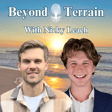
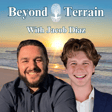
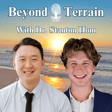
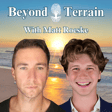
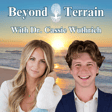
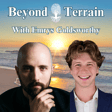
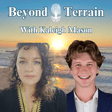
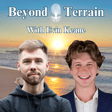
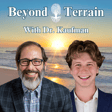
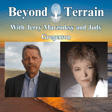
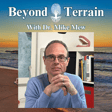
![DNA Doesn't Exist & Genomic Nonsense with Dr. Jerneja Tomsic [Part 2] image](https://media.zencastr.com/cdn-cgi/image/width=112,quality=85/image-files/652933f3a749dc383eb375de/ce5a5fd9-98c9-44fe-9b4b-3d0cd5abcf29.png)
